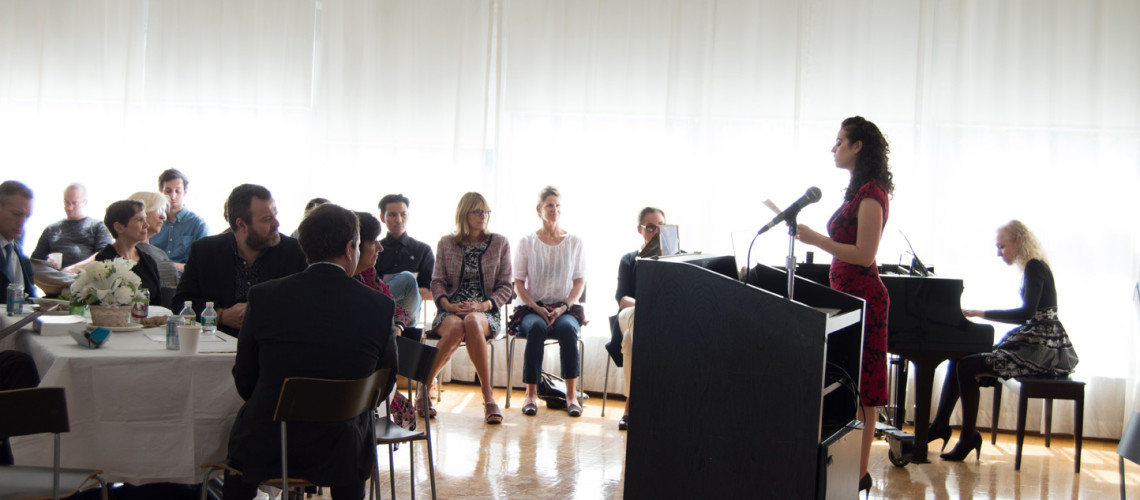
By Brendan Heldenfels, Eugene Lang College, Class of 2015 In the days after Professor Robin Mookerjee’s passing in May 2016, I scoured Facebook for memories... Read More

On October 27th the Poetry Society of America is hosting the Pulitzer Centennial Poetry Celebration, where 13 Pulitzer Prize-winning poets will share the stage to... Read More

What does it mean to study poetry in Literary Studies at Lang? Students explore what it means to be a writer and reader of... Read More
By Brendan Heldenfels, Eugene Lang College, Class of 2015
In the days after Professor Robin Mookerjee’s passing in May 2016, I scoured Facebook for memories and recollections of him, desperate to hang on to pieces of him left behind. Among those memories was a posting Robin made: “Common sense is a form of insanity.” It’s unclear to me if he came up with that himself, but it has his wry, slightly askew voice, so loved by his students and friends. You can hear him dropping it as a conversation opener or as an aside during a lecture. When many of Robin’s friends, family, and students came together to celebrate his life on September 17th, I thought of this phrase again and again. It was clear that even if Robin didn’t write it, he believed it. He lived it.
I was Robin Mookerjee’s student for two courses, and a teaching assistant for a third. He was always mysterious to me, as if he’d stepped out of the pages of a late-eighties-early-nineties novel about New York. He was the kind of figure you didn’t think existed at universities anymore – teachers that couldn’t possibly be real.
Throughout the celebration of his life, people spoke about how they encountered a similar kind of mysterious, surprising presence in Robin. These surprises came at every turn. First, an array of New School professors, — James Fuerst, Colette Brooks, Elaine Savory, Neil Gordon, and Val Vinokur — read selections of Robin’s recent poetry, chosen by his beloved wife, Lucy. These poems, as yet uncollected, combine deep passion with keen observation. Professor Wendy Walters also presented a poem, inspired by Emily Dickinson and set to music by Stefania de Kenessey, which evoked Robin’s ability to speak directly, almost to the point of transgression. “Robin is gone,” the singer wailed, and it was hard not to think he’d be pleased by the simple power of that phrase. Robin’s friends and family spoke often, and repeatedly, of Robin’s saying what no one wanted to say, but also of his boundless enthusiasm – for literature, for music, for the beach. Of particular note was the writer Sandra Newman, who introduced herself as Robin’s ex-wife before going on to tell stories from Robin’s private school days and his never-ending desire to explore ideas and arguments, often at all hours of the day and night. Ms. Newman’s remembrance was funny, pointed, and direct — it was ineffably true to Robin.
I also spoke, briefly, about Robin’s incredible passion and devotion to his students. Many of Robin’s recent students wished they could attend, but were unable to, and I attempted to describe the effect he had on all of us. He was unfailingly generous and patient with his time when students ran into personal or academic difficulty that caused them to fall behind on work or miss classes, and that is something I personally appreciate. But what I’ll always remember about Robin is his smile when you were talking to him as a student. It was a little smirking, a little skeptical, and a little encouraging, all at once. It was a smile that said he didn’t want you to look for the answer you thought he wanted — he wanted your answer. He wanted to know what you thought, what you believed, even if it was a little controversial, a little transgressive. Through that smile, he pushed many of us to new ideas, new acts of creation. New lights, going off in the dark.
The celebration of Robin ended with two musical numbers. Robin’s sister Paula put together a brilliant slideshow of his life, where Robin grew younger, then older, then younger again, until both the child and the professor — each with that sly, smirking smile — were side by side. But before this, his brother Kirit led those of us lucky to be there in a rendition of the Smiths’ “There is a Light That Will Never Go Out,” changing the thundering chorus to “Robin is a light that will never go out.” Brilliant, multifaceted, challenging, giving, witty, pithy, original, and absolutely uncommon — Robin Mookerjee is a light in the hearts of those who loved him. A light that guides the way towards that uncommon place where new ideas are born. A light that will never go out.